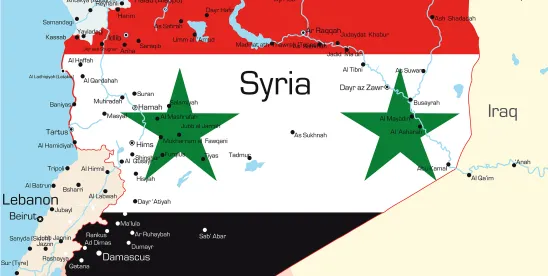The pace of U.S. regulatory changes regarding Syria continues to increase. Building on our previous posts (“Syria-ous Changes for Middle East Business?” and “Unpacking the U-Turn: What the Syria Sanctions Repeal Really Means”), we describe below the recent developments that have resulted in significant easing of export controls.
Easing Export Controls: The BIS Rule
On August 28, 2025, the Bureau of Industry and Security (BIS) published a final rule, effective September 2, 2025, that substantially reduces EAR restrictions on exports and reexports to Syria.
A new license exception. Most notably, BIS created the new License Exception Syria Peace and Prosperity (SPP), authorizing the export and reexport of all EAR99 items to Syria. However, even when exporters make use of License Exception SPP, their exports will still be subject to EAR end-use and end-user restrictions, including prohibitions on transactions involving parties listed on OFAC’s SDN List, BIS’s Entity List, or denied persons.
Broader license exceptions. BIS also expanded several existing license exceptions. The most impactful is the extension of Consumer Communications Devices (CCD) to Syria. License Exception CCD now allows for the export to Syria of common consumer technologies such as computers, mobile and satellite phones, SIM cards, monitors, printers, routers, WiFi access points, storage devices, digital cameras, and consumer cybersecurity tools (like VPN clients and password managers). Further, unlike the License Exception CCD for Cuba, Belarus, and Russia, Syria’s License Exception CCD does not limit the excepted exports to those made by NGOs.
Other changes to export control restrictions on Syria include expanded eligibility for Replacement Parts (RPL)—though aircraft parts and items controlled for national security reasons remain excluded because Syria remains in Country Group E:1. Exporters must also seek a General Prohibition 10 waiver to deal with an item if that original item was initially exported unlawfully. The Aircraft, Vessels, and Spacecraft (AVS) license exception now allows temporary sojourn of U.S.-registered civil aircraft and vessels in Syria and authorizes the export or reexport of spare parts classified as EAR99 or controlled solely for Anti-Terrorism (AT) reasons. BIS clarified that ECCNs such as 2B999, 3A991, 4A994, 5A992 (except .z), and 9A991 fall into that category of AT-only controlled items. In addition, BIS broadened the scope of TMP (temporary imports/exports), GOV (government and NATO uses), and TSU (technology and software updates), while confirming that BAG (personal baggage) remains available for travelers to Syria.
A new licensing policy. Finally, BIS revised its licensing policy with respect to Syria. Applications for exports for commercial or civil end uses that support Syria’s reconstruction and civilian economy—such as telecommunications, sanitation, water supply, power generation, and aviation—will now be reviewed under a presumption of approval. Other applications will be assessed case by case. BIS encourages applicants to provide detailed Letters of Explanation demonstrating how their exports will benefit the Syrian people.
Continuing Controls and Cautions
Despite the changes described above, critical restrictions on exports to Syria remain in effect. Exports and reexports involving sanctioned parties remain prohibited, and no exceptions authorize activities that would support Syria’s military, police, or intelligence services. Exporters must also remember that replacement parts and servicing remain restricted for aircraft and NS-controlled items, with AVS limited to EAR99 or AT-only parts. Moreover, if an export would significantly enhance Syria’s military capabilities or ability to support terrorism, the Secretaries of State and Commerce must notify Congress 30 days before a license can be granted.
Bottom Line: Opening, But with Caution
The easing of restrictions on Syria creates new opportunities for businesses in sectors such as telecommunications, consumer technology, aviation, and infrastructure. However, the risks remain real for companies entering the country. Those companies must carefully verify product classifications, screen counterparties and their beneficial owners for potential end-use or end-user restrictions, and augment required license applications with robust, policy-based support.
In short, the door to Syria is opening wider, but successful entry requires a bit of caution and strong compliance discipline.





 />i
/>i

